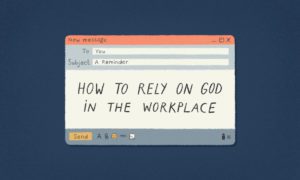Why We Should Stop Being “Resilient”
Andrew works for City Bible Forum and is the National Manager of their Life@Work program, which aims to help Christians connect their faith with their daily work. He is the author of two books about work, including I Am What I Do, and Under Pressure. He is the former Dean of Ridley College’s Marketplace Institute, and has a background in radio journalism. He lives in Canberra with his wife Carly and three school-age children.
Have you ever been in the back of an ambulance?
I have, once. For a suspected heart attack.
Six hours later, I was given the all clear. My heart was in perfect working order, but doctors had another diagnosis for me—what I thought was a heart attack was, in fact, my body giving up. I was burnt out from being under pressure from work for far too long.
I share that because it is incredibly common today, especially in Australia where we have earned the title of one of the burnout capitals of the world. Millions of people are working excessive hours, which has been normalised to the point that burnout has become commonplace.
All of this raises two questions for me:
Why are we working so hard that so many of us are burning out?
What’s the solution?
In the years since that ambulance episode, I’ve had a lot of time to reflect on the first question, and the short answer is, it isn’t one single thing but a combination of external and internal pressures.
External pressures include the expectations of others—the demands of an employer upon an employee, a punishing workplace culture, the rising cost of living, as well as the increased mental load associated with the disruptions due to Covid.
But to say we experience burnout only because of external pressures misses a big chunk of the reason why, especially for my case.
So what was the internal factor? I cared far too much what other people thought about me.
This meant I overworked to impress others, and I didn’t like to ask for help even when it was getting too much. I saw all these other successful people around me, people I aspired to be like, who took on more and more and they coped—at least it seemed they did—so why can’t I?
“Suck it up, Andrew, and power on,” I’d say to myself.
The myth of resilience (and how I bought into the lie)
Herein lies the solution frequently given to those overwhelmed by workload: resilience.
Talk about resilience is everywhere. Businesses put it in their mission statements, educational institutions offer training on it, and there’s no shortage of TED talks about how to achieve it.
When corporate leaders or educators talk about being more resilient, they’re usually talking about the need to be more durable under pressure. When setbacks inevitably hit, the resilient will bounce back.
Interestingly, resilience—at least the version of it that’s commonly talked about—is a very modern phenomenon. Between 2000 and 2020, there was a five-fold increase in use of the word in popular culture. Now, how did this happen?
Late last year, one of the UK’s leading commentators on the workplace, Bruce Daisley, published a fascinating book titled Fortitude: The Myth of Resilience, and the Secrets of Inner Strength. It described how our culture is filled with “redemption of resilience plotlines”:
- The sportsperson who overcomes adversity;
- The war victim who rises from the ashes;
- The housing-commission kid who against odds becomes Prime Minister;
- Stories of “I get knocked down, but I get back up again”
Here’s where it gets interesting: Daisley quotes research from psychologist Alex Haslam, who believes that all this talk about resilience began in the early 2000s, when there was a growing awareness of how workplace culture was hurting employees.
With rising stress, poor health, and employers coming under increasing pressure to solve these problems, Professor Haslam concludes that businesses did a brilliant job of shifting the responsibility from the so-called “manufacturer” to the consumer:
One way they did that was by saying ‘Ok, we’ve had enough of talking about this bad stuff. Let’s start looking on the positive side and talking about resilience’. [The result was] really to take the spotlight off organisations and to focus on the people and effectively have a psychological analysis which said, ‘The real problem here is that people aren’t resilient enough’.
And that, right there, is the myth: in all the stories about resilience, it’s the individual who “has” the resilience, or is responsible for making it grow and happen.
You don’t have enough resilience? Well, exercise more. Eat healthier. Get longer hours of sleep. Meditate. Have more social lunches with colleagues. And the list goes on, and on.
The solution to your problems lies within you. You get knocked down? It’s your job to get yourself back up.
This was precisely what was at play in my burnout. Having resilience meant that I couldn’t admit failure or weakness. I needed to suck it up and manage it, figure things out, on my own. So things got harder, and harder, and harder until eventually my body said, “Enough!”
There is a better way
This huge pressure we’re putting ourselves under to carry the burdens of life, and in particular our work, we can outsource it. But who?
Who cares enough about us that we can risk admitting, “I can’t do it all, I can’t cope with it all. I’m exhausted from trying”? To whom can we entrust such a vulnerable confession, without them using it against us?
Come to me all you who are weary and burdened and I will give you rest. Take my yoke upon you and learn from me, for I am gentle and humble in heart, and you will find rest for your souls. For my yoke is easy and my burden is light. (Matthew 11:28-30)
Those are the words of Jesus, spoken over 2,000 years ago to a people not so different from you and me—a people who were also weighed down by a pressure to prove themselves. They were part of a society that measured status not so much by work accomplishments like ours, but by religious accomplishments, and they were exhausted from trying.
Enter Jesus with these life-giving, freeing words: “Come to me, all you who are weary and burdened, and I will give you rest”.
When I burnt out, I took lots of steps to recover, to set in place changes to ensure it didn’t happen again: Things like doing more exercise, eating healthier, getting longer hours of sleep. Those things really do help.
But on their own, they didn’t address my biggest burdens:
- The need to perform for others
- The need to prove myself
- The persistent, faulty thinking that the strength and resilience I need for work and life is all up to me
I needed someone outside of me that I could trust, who would carry those burdens for me. Who wouldn’t demand anything of me. Whom I could trust with my life.
How do we give our burdens to Jesus?
Firstly, it means verbally handing them over to Him in prayer. It means making a deliberate choice to say to Jesus, every day: “I can’t do this on my own. I’m kidding myself when I think I can. Forgive me for thinking this way, and help me to admit where I need help. To start, would You help me with this today?”
Secondly, we go to Him in His word. Open the pages of the Bible and read the comforting truths that remind us that while we are finite, He is infinite (Isaiah 40:28-29, Ephesians 3:20). Where we are weak, He is strong (2 Corinthians 12:9-10). We are dependent creatures who can’t do life on our own, but we can trust in the One who does not need anything from us, yet freely gives Himself for us (Romans 8:31-32).
In continually practising these two things, I have found that gently, and slowly over the years, this has changed how I view myself in relation to others. With each passing year, I’ve found myself accepting my limits more and caring just a little bit less about the opinion of others, knowing that I’m secure in Christ.
Let me be clear: this has been a slow and gradual process! But practising these two things—praying and reading the Bible—has led to God changing me over time.
He carries all our burdens
In coming to Jesus and giving Him all my burdens, I’ve found someone willing to take them on Himself.
And not just my physical burdens, but burdens of:
- having to prove myself to others
- guilt about mistakes I’ve made in the past
- feeling trapped in a life that isn’t going how I hoped.
Burdens to be everything to everyone, whoever they demand I be. Burdens that I don’t feel I could ever share with anyone else.
Where I felt I had to prove myself to others, Jesus reminds me my worth and value comes from who I am in Him (Matthew 3:17).
Where I felt guilt about mistakes I’ve made, He has reminded me that in Him I am washed clean (Isaiah 1:18).
And where I’ve felt burdened that life is not going as planned, He has responded, “Andrew everything I am working for your good and my glory” (Romans 8:28).
In all these situations, Jesus has said, “Andrew, come. Come to me, give me your burdens, and I will give you rest.” Soul rest, a rest that goes deeper than physical rest.
One of the ways Jesus carries our burdens is by giving us people in our lives to help us with them, so let’s learn to ask for help! Whether it be from a colleague, a friend, a family member, or especially the Christian community—the church is a key tool Jesus uses to help carry our burdens (Galatians 6:2).
Not only can this help us, it is also a powerful witness, being humble to know that we are finite beings and need Someone greater to carry our burdens.
May you find the rest you need, not in your own strength, but in Jesus and all that He has provided you.
















Leave a Reply
Want to join the discussion?Feel free to contribute!